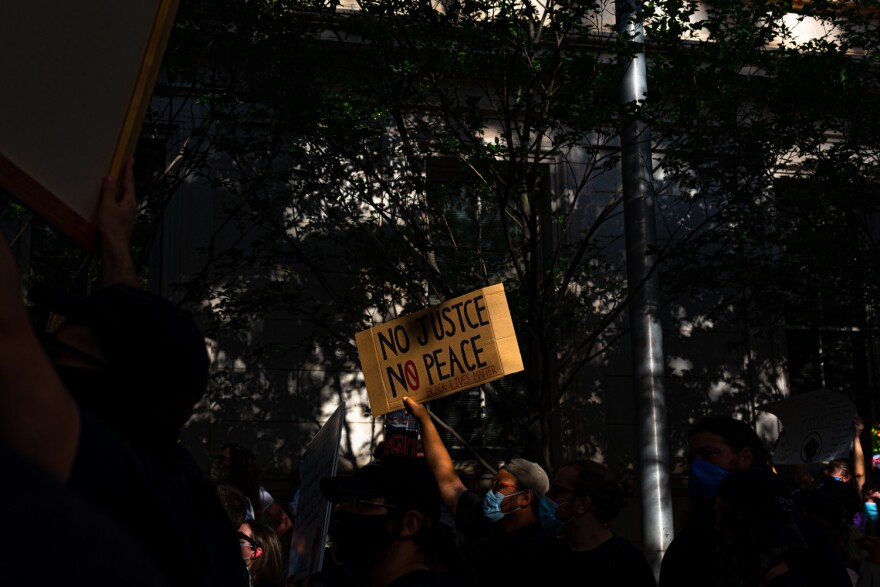Law enforcement agencies across the state refuse to tell the public how they use force when policing their communities, citing provisions in state law they say shield such records from public view.
That's according to a survey of more than a dozen state and local police departments and sheriff's offices in North Carolina conducted over the past two weeks by a network of journalists from across the state.
Law enforcement practices have faced added scrutiny since a Minneapolis police officer killed George Floyd, a 46-year-old black man, on May 25, touching off weeks of protest against systemic racism and police brutality. Activists across the country have demanded increased accountability for officers, an end to aggressive policing practices and shifts in funding from law enforcement to social services.
Amid those calls for reform, several cities and states have already moved to introduce new measures aimed at transparency, in some cases making disciplinary records or use-of-force records public.
In North Carolina, Democratic Gov. Roy Cooper issued an executive order to create a task force on racial equity in criminal justice. Cooper's measure charges the group to come up with recommendations to help eliminate disparities against communities of color. It also creates a Center for the Reduction of Law Enforcement Use of Deadly Force, in part to collect data and analyze the use of lethal force by police.

Some use-of-force data, aggregated and anonymized, is already available from state and local law enforcement agencies. But the details — such as the officers involved, how force was used and why — are mostly off-limits to the public.
Journalists asked 18 of the state's largest law enforcement agencies for use-of-force reports covering incidents over the weekend of May 30, when protests began to spread in earnest across the country.
Not every agency has responded, and some didn't have any use-of-force incidents for the time period. But those that did respond denied the request or told reporters such records were off limits to the public.
In Raleigh, where law enforcement from the city police department, Wake County Sheriff's Office and State Highway Patrol all shot tear gas to disperse crowds of downtown protesters, Raleigh Police Department spokesperson Dia Harris said the public wasn't entitled to records on how those measures were used.
Harris said the department considers use-of-force reports personnel records, making them subject to provisions in state law protecting the privacy of government agency employees. More than a half-dozen law enforcement agencies across the state also consider the reports part of their personnel records, including the State Highway Patrol, the Guilford County Sheriff's Office and police departments in Durham and Greensboro.

For the Fayetteville Police Department and several other agencies, details on how officers use force are included in the narratives of incident reports. That narrative is then considered a "use of force report," and may become part of an internal affairs investigation.
"None of that is public record," said Sgt. Jeremy Glass, a spokesperson for the Fayetteville Police Department, said of the narrative and any subsequent internal affairs investigation.
In Wilmington, both the sheriff's office and police department said the after-action reports for uses of force, including the use of tear gas, or deployment of the civil disturbance unit are considered "tactical information" or part of a criminal investigation.
Exemptions that cover ongoing criminal investigations are broad, and allow law enforcement to refuse to disclose an array of other records beyond those covering use of force.

Open Records Advocates Weigh In
Jonathan Jones, an attorney with experience both as a prosecutor and as an advocate for open government, said whether a use-of-force report can be released depends on how an agency uses the report. If the report is used to evaluate officer conduct and determine whether discipline is necessary, Jones said, then it's likely a personnel record.
"That's important because that is one of the few exceptions to the public records law that's not discretionary," he said in an email.
But if a department doesn't use the reports to evaluate personnel conduct, then he says the reports can be released.
"If they're only used as an investigative tool, then they fall under the law enforcement exemption, which is entirely discretionary," Jones said.
Even if use-of-force records are filed as personnel records, Brooks Fuller, director of the N.C. Open Government Coalition and Sunshine Center at Elon University, said they're not automatically protected from public inspection. Otherwise, any reports created by police could simply be stored in a personnel file, and then kept hidden.
"There's perhaps, nothing more important than being able to hold power accountable when that power source – in this case police officers – has the ability to use deadly force against citizens," said Fuller. "So it's crucial that the public be informed of how well police departments are meeting their obligations to protect people in our communities."

Democratic Attorney General Josh Stein, one of the co-chairs of the governor's new Task Force for Racial Equity in Criminal Justice, stopped short of saying use-of-force records should be public in an interview Monday. But he said more information gives the public the ability to determine "what's right and what's wrong."
"That transparency also creates greater accountability, because when people know what they do is going to be viewed by more people, they're more likely to do the right thing," Stein said. "So my bias is always towards transparency."
Asked twice at a June 9 press briefing, Cooper also declined to say whether use-of-force reports should be public. Instead, he said the topic is one he's depending on the task force to handle.
"When you're talking about changes like that — you're talking about potentially changes in the North Carolina General Assembly — there may be degrees of disclosure that you would want to get into," Cooper said in the briefing.
Jones said the legislature should re-evaluate the law as it relates to use-of-force reports and consider finding a way to make them more accessible to the public.
"Either way, law enforcement agencies have too much discretion to withhold records and the events of recent weeks highlight why," he said in an email. "While the overwhelming majority of officers are fantastic, there are far too many individual officers who skate through for years with a pile of complaints against them."

Stein acknowledged the issue is among those the task force will tackle in the coming months before its final recommendations are due to the governor by Dec. 1. Legislative changes, he said, may be necessary.
"What we want to do as a task force is review this and figure out what is the best way to handle this so the public has as much information about what's happening that we can then hold agencies and officers accountable," Stein said.
But Stein also pointed out that law enforcement has some discretion to release use-of-force reports — even in cases where the records are considered part of a personnel file. A provision of the law specifically allows for the release of records in cases where the information is important to "maintain public confidence" in the agency.
"If the chief or the mayor were of the mind that there was something in the report or that would be of some value to the public to have trust in what happened, then they have that ability under current state law to release it," Stein said.

Some Data Exists, But So Do Gaps
Another option, Stein said: Agencies can release the data in aggregate.
And several law enforcement agencies do that already.
The Raleigh Police Department counted 519 use-of-force incidents in 2019, and 199 so far in 2020. Data provided by the department Monday did not include additional details about the incidents.
Glass said the Fayetteville Police Department includes aggregate data in annual and quarterly reports to city council. Data presented to the council on May 11 showed nine use-of-force incidents from January to March 2020 and 12 in the same time period in 2019.
In Durham, police spokesperson Capt. Melissa Bishop said the department's Professional Standards Division includes aggregate data in its annual reports. Their most recent is for the 2018 calendar year. Bishop said the 2019 report hasn't been released yet due to delays from a March malware attack against the city and coronavirus-related shutdowns.
Data from the Asheville Police Department provides detail on the demographics of people subjected to force and the type of force and is updated quarterly.

Police used tear gas and rubber bullets on protesters in late May and early June. Aggressive police action against a medic station at a protest event has prompted apologies from the mayor and police chief, as well as promises of an outside investigation and broad restructuring of the police force. But the use-of-force reports from those events won't be made public under the current policy for months.
The State Bureau of Investigation also tracks data on deadly force statewide, the result of a federal law dating back to 1994. SBI spokesperson Angie Grube said the agency started collecting the data in 2010 and updates it annually. The most recent data ends in 2019, and it does not include use-of-force incidents involving less lethal measures.
Nationwide, transparency advocates have pushed for the release of use-of-force records themselves, which provide far greater detail on each incident and the law enforcement officers involved.
In Arkansas, the Arkansas Supreme Court ruled in 2012 that use-of-force reports are public record. The Little Rock Police Department previously denied a request for a force report, saying the reports are "employee evaluation and job performance records," which are exempt under open records law in the state.
In its opinion, the court disagreed, concluding that use-of-force reports do not fall under that exemption.
Two years ago, the U.S. Commission on Civil Rights issued a report calling for better data, training and oversight to reduce excessive force.
"Repeated and highly publicized incidents of police use of force against persons of color and people with disabilities, combined with a lack of accurate data, lack of transparency about policies and practices in place governing use of force, and lack of accountability for noncompliance foster a perception that police use of force in communities of color and the disability community is unchecked, unlawful, and unsafe," commission chair Catherine E. Lhamon said in a letter to President Donald Trump.
Although the issue isn't a new one, Stein said it's been made more relevant by Minneapolis Police Officer Derek Chauvin's killing of Floyd, behavior the attorney general said "has shaken everybody."
"We want to constantly be improving to meet the needs of the moment," Stein said. "There's not necessarily a single right answer. Sometimes it's: What's the answer for today?"

This story was jointly reported and edited by Kate Martin, Jordan Wilkie and Frank Taylor, of Carolina Public Press; Gavin Off and Ames Alexander, of The Charlotte Observer; Lucille Sherman and Jordan Schrader, of The News & Observer; Nick Ochsner, of WBTV; Emily Featherston, of WECT; Tyler Dukes, of WRAL; and Jason deBruyn, of WUNC-FM.
Correction: A previous version of this story incorrectly reported the date of George Floyd's death. It was May 25, not March 25.
A previous version of this story also incorrectly reported the timeline for Fayetteville Police Department's use of force statistics. The data referred to incidents from January to March in both 2019 and 2020.
Clarification: This story was updated to clarify comments from Fayetteville Police spokesperson Sgt. Jeremy Glass that the narrative portion of an incident report, not the entire incident report, is exempt from public records disclosure.









